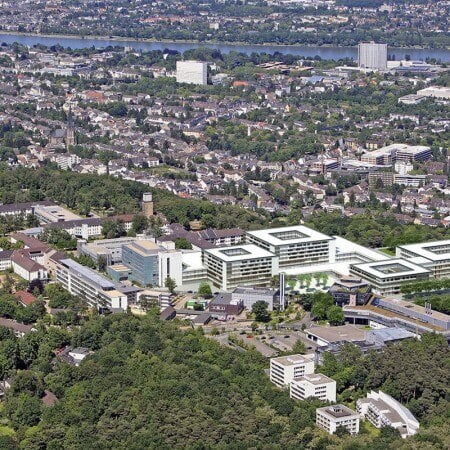Graves disease (diffuse toxic goiter) is an autoimmune disease that primarily affects the thyroid gland. When complications develop, the condition can also affect many other organs, including the eyes and skin. This pathology is the most common cause of hyperthyroidism, characterized by high thyroid hormone levels in the blood. You can undergo your treatment of Graves disease in Germany to get rid of it once and for all. Doctors in German hospitals use conservative therapy to eliminate hyperthyroidism. They can also remove the thyroid gland or destroy it with radioiodine therapy.
Content
- Diagnostics
- Principles of treatment
Doctors in Germany use three methods of treatment for Graves disease: conservative therapy, thyroidectomy and radioiodine therapy.
You can undergo your treatment in one of the following hospitals: University Hospital Carl Gustav Carus Dresden, Hospital Neuperlach Munich, or University Hospital Jena.
If you book your treatment through Booking Health, we will fully organize your trip to Germany. Our employees will help you to choose a clinic and a doctor, quickly make an appointment, get a visa, buy airline tickets and book a hotel. You will go to the clinic with an interpreter, and you can contact your personal coordinator for all organizational issues.
Diagnostics
Doctors use the following methods to diagnose Graves disease:
Determination of TSH receptor antibodies. Doctors in Germany use 3rd generation tests, the accuracy of which reaches 99%.
Radioactive iodine uptake test. This test allows assessing the functional activity of the thyroid gland and the autonomy of nodular formations.
Thyroid ultrasound with dopplerography. Graves disease is characterized by the excessive blood supply to the gland (hypervascularization).
Determination of the ratio of T3 and T4 hormones. This helps doctors distinguish Graves disease from thyrotoxicosis associated with thyroiditis.
Principles of treatment
The task of physicians is to:
- reduce the production of thyroid hormones;
- eliminate the symptoms of increased hormone production;
- control autoimmune damage to other organs if the area of damage is not limited to the thyroid gland.
The main problem of patients is that thyroid hormone levels are elevated. The three following methods can be used to reduce them:
- strumectomy, which is the surgical removal of the thyroid gland;
- radioiodine therapy, which is the destruction of an organ by radiation;
- antithyroid (thyreostatic) drugs that reduce the activity of the gland.
Conservative therapy
Conservative treatment includes:
- blocking the production of hormones;
- fight against the manifestations of hyperthyroidism.
Doctors prescribe thyreostatic drugs to reduce the production of hormones. These are used for a long course, and the dosage is selected in dynamics, under the control of laboratory tests. Once the indicators are normalized, the specialists switch to a maintenance dose used for several months. Then healthcare professionals can try to cancel therapy if the hormone levels are normal.
At the initial stage of treatment, symptomatic therapy is often used. For example, patients may receive drugs to normalize their bowel function and lower heart rate and blood pressure. After the normalization of hormone levels, these drugs will be canceled.
Surgical treatment
Surgery can be recommended in the following cases:
- the volume of the thyroid gland exceeds 60 ml;
- compression symptoms in the neck organs;
- suspected thyroid cancer;
- the size of nodes in the thyroid gland exceeds 4 cm;
- very high antibody levels in the blood;
- a concomitant parathyroid adenoma.
Before the operation, patients are prescribed thyreostatics, iodine, and sometimes beta blockers, calcium and vitamin D preparations. The operation in Germany can be performed not only by the classical method through a large incision, but also by the endoscopic method to improve the aesthetic result. Thyroid removal contributes to the cessation of hormone production, so patients receive replacement therapy.
Radioiodine therapy
The essence of radiotherapy is the destruction of the thyroid gland with radioactive iodine. The technique can be used in patients older than 21 years. After therapy, women must not become pregnant for 6-12 months. This is a third-line treatment method: the therapeutic procedure is used for contraindications to prescribing drugs or their low effectiveness and for comorbidities that increase the risk of surgical complications.
The very first step is a patient's preparation: therapy with beta blockers and antithyroid drugs. Patients are then given radioactive iodine capsules. These are captured by thyroid cells and destroy them. The dose is calculated individually, based on the volume of the thyroid gland. The patient must comply with radiation safety measures to avoid exposure to family members. The final effect is achieved after 6 months. If hyperthyroidism persists, the procedure can be repeated.
Radioiodine therapy does not always lead to hormone level normalization, since the destruction of the thyroid gland can be excessive. In this case, the concentration of hormones will be below normal. This problem can be solved by thyroid hormone replacement therapy.
You are welcome to use the Booking Health service to undergo your diagnostics, treatment and rehabilitation in Germany. Here you can choose clinics in Germany, compare the cost of treatment and make your appointment at the best price. The Booking Health staff will help you to choose a medical center and organize your trip.
Authors:
The article was edited by medical experts, board-certified doctors Dr. Nadezhda Ivanisova and Dr. Sergey Pashchenko. For the treatment of the conditions referred to in the article, you must consult a doctor; the information in the article is not intended for self-medication!
Sources:
National Library of Medicine
Centers for Disease Control and Prevention
Medical News Today




















